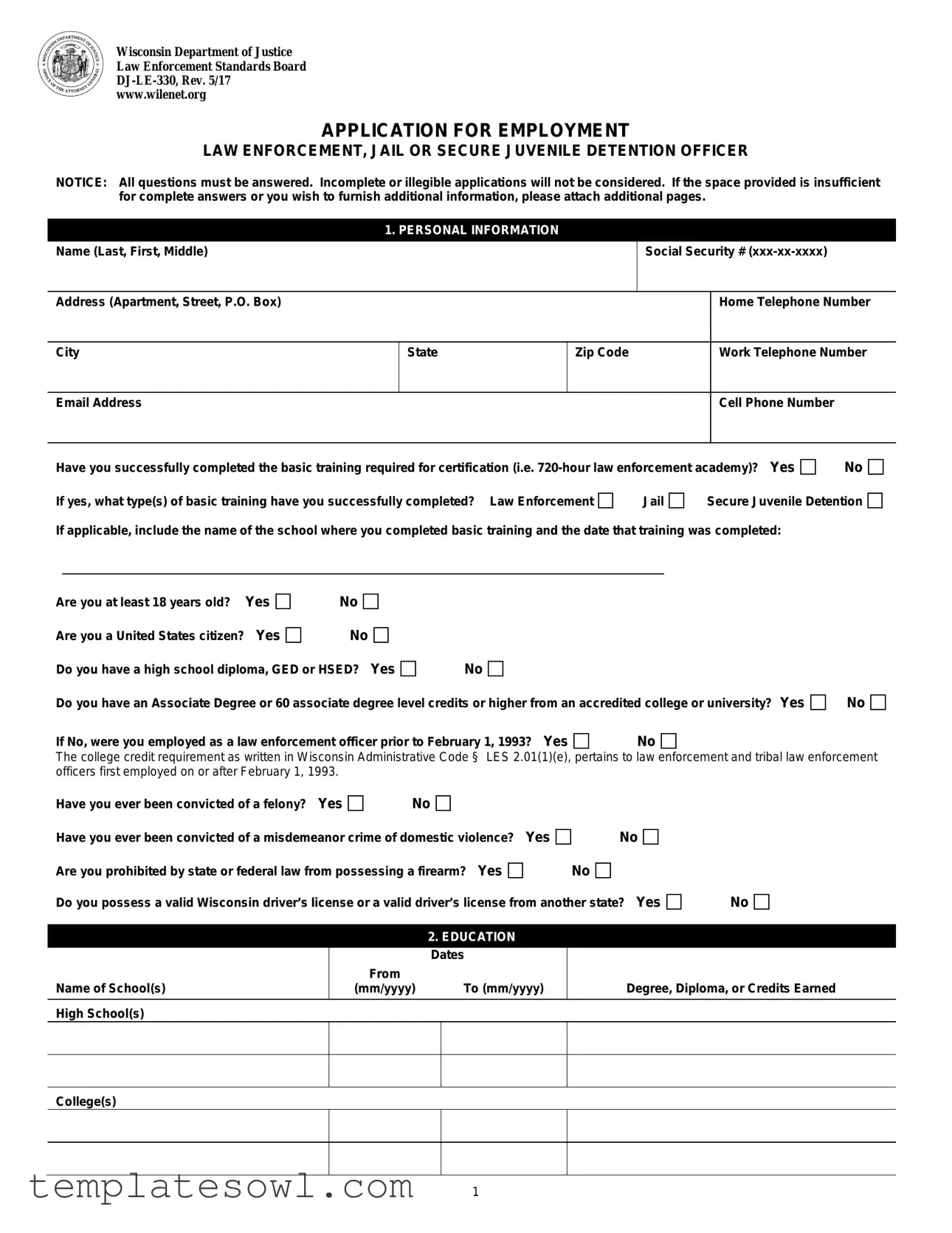Fill Out Your Dj Le 330 Form
The DJ LE 330 form is an essential document for individuals seeking employment as law enforcement officers, jail officers, or secure juvenile detention officers in Wisconsin. This application is divided into several sections, each designed to capture key personal, educational, employment, military, and reference information. Applicants must provide their full name, social security number, and contact details, ensuring that all questions are answered completely as incomplete submissions will be disregarded. Education plays a significant role in the application, with questions regarding high school and college credentials, as well as the completion of basic training for certification. Prior employment history must be detailed, documenting not only the job titles held but also the salary, supervisor contacts, and reasons for leaving each position. In addition, applicants are asked to disclose their military service history and to supply three professional references who are not related to them. There is an emphasis on compliance, with a certification section at the end that ensures the accuracy and completeness of the provided information, underpinning the serious nature of the hiring process. As such, potential candidates must approach the DJ LE 330 form with careful attention and thoroughness to align with the standards required for a law enforcement position.
Dj Le 330 Example

Wisconsin Department of Justice
Law Enforcement Standards Board
www.wilenet.org
APPLICATION FOR EMPLOYMENT
LAW ENFORCEMENT, JAIL OR SECURE JUVENILE DETENTION OFFICER
NOTICE: All questions must be answered. Incomplete or illegible applications will not be considered. If the space provided is insufficient for complete answers or you wish to furnish additional information, please attach additional pages.
1. PERSONAL INFORMATION
Name (Last, First, Middle)
Social Security #
Address (Apartment, Street, P.O. Box)
Home Telephone Number
City
State
Zip Code
Work Telephone Number
Email Address
Cell Phone Number
Have you successfully completed the basic training required for certification (i.e. |
No |
||
If yes, what type(s) of basic training have you successfully completed? Law Enforcement |
Jail |
Secure Juvenile Detention |
|
If applicable, include the name of the school where you completed basic training and the date that training was completed: |
|
||
Are you at least 18 years old? |
Yes |
No |
|
Are you a United States citizen? |
Yes |
No |
|
Do you have a high school diploma, GED or HSED? Yes |
No |
||
Do you have an Associate Degree or 60 associate degree level credits or higher from an accredited college or university? Yes
No
If No, were you employed as a law enforcement officer prior to February 1, 1993? Yes |
No |
The college credit requirement as written in Wisconsin Administrative Code § LES 2.01(1)(e), pertains to law enforcement and tribal law enforcement officers first employed on or after February 1, 1993.
Have you ever been convicted of a felony? Yes
No
Have you ever been convicted of a misdemeanor crime of domestic violence? Yes
No
Yes
No
Yes
No
Degree, Diploma, or Credits Earned

3. EMPLOYMENT
Begin with current or most recent employer. List chronologically all employment, including summer and
Name and Address of Employer |
|
Dates of Employment |
||
From (mm/yyyy) |
To (mm/yyyy) |
|||
|
||||
Name of Employer: |
|
|
|
|
|
|
|
|
|
Address: |
|
|
Annual Salary/Wages: |
|
|
|
|||
|
|
|
|
|
City: |
State: |
|
Zip Code: |
|
|
|
|
||
Supervisor’s Name / Telephone Number: |
May we contact the employer / |
supervisor? |
||
|
Yes |
No |
|
|
Position and kind of work:
Reason for Leaving:
|
|
|
|
|
Name and Address of Employer |
|
Dates of Employment |
||
From (mm/yyyy) |
To (mm/yyyy) |
|||
|
||||
Name of Employer: |
|
|
|
|
|
|
|
|
|
Address: |
|
|
Annual Salary/Wages: |
|
|
|
|||
|
|
|
|
|
City: |
State: |
|
Zip Code: |
|
|
|
|
||
Supervisor’s Name / Telephone Number: |
May we contact the employer / |
supervisor? |
||
|
Yes |
No |
|
|
|
|
|
||
Position and kind of work: |
Reason for Leaving: |
|
||
|
|
|
|
|
|
|
|
|
|
Name and Address of Employer |
|
Dates of Employment |
||
From (mm/yyyy) |
To (mm/yyyy) |
|||
|
||||
Name of Employer: |
|
|
|
|
|
|
|
|
|
Address: |
|
|
Annual Salary/Wages: |
|
|
|
|||
|
|
|
|
|
City |
State: |
|
Zip Code: |
|
|
|
|
||
Supervisor’s Name / Telephone Number: |
May we contact the employer / |
supervisor? |
||
|
Yes |
No |
|
|
|
|
|
||
Position and kind of work: |
Reason for Leaving: |
|
||
|
|
|
|
|
|
|
|
|
|
|
|
|
|
|
2

Branch of Service
From
(mm/yyyy)
|
4. MILITARY SERVICE |
|
|||
To |
|
Active Duty or |
|
|
|
|
|
|
|||
(mm/yyyy) |
|
Reserve |
|
|
Highest Grade |
|
|
|
|
|
|
Skill Specialty or Primary Duty
Honorably Discharged from Military Service? Yes |
No |
Not Applicable |
|
|
|
|
5. REFERENCES |
|
|
|
|
Give three references (not relatives, or present employer; avoid listing members of the clergy).
Name:
Position/Title/Profession:
Number of Years Acquainted:
Address:
City/State/Zip:
Telephone Number:
Name:
Position/Title/Profession:
Number of Years Acquainted:
Address:
City/State/Zip:
Telephone Number:
Name:
Position/Title/Profession:
Number of Years Acquainted:
Address:
City/State/Zip:
Telephone Number:
6. GENERAL
COMPLETE IF INSTRUCTED TO DO SO BY EMPLOYING AGENCY.
Attach no more than one additional page for each answer.
A.Why have you chosen to apply for this position?
B.Discuss things you have done which have contributed to your life experience. Be sure to include information regarding volunteer work with civic, school, or professional organizations. Be specific about names and dates.
C.Why do you believe you could relate to and/or work with people of different races, genders, cultures, ages,
3

APPLICANT PLEASE READ CAREFULLY AND SIGN BELOW
Information provided and statements made as part of this application may be grounds for not employing you or for dismissing you after you begin work. All information and statements made are subject to verification.
CERTIFICATION
ALL INFORMATION PROVIDED AND STATEMENTS MADE BY ME AS PART OF THIS APPLICATION, OR AS PART OF ANY ADDITIONAL INFORMATION PROVIDED IN SUPPORT OF THIS APPLICATION, ARE COMPLETE, CORRECT, AND TRUE TO THE BEST OF MY KNOWLEDGE.
I UNDERSTAND THAT IF I AM EMPLOYED, FALSE INFORMATION PROVIDED OR FALSE STATEMENTS MADE AS PART OF THIS APPLICATION MAY BE CONSIDERED AS CAUSE FOR DISMISSAL.
Applicants Signature |
Date Signed |
Under the provisions of § 19.36, Wis. Stats., I request that my identity as an applicant for this position not be revealed without my consent or until required under law.
Applicants Signature |
Date Signed |
APPLICANT: COMPLETE QUESTIONS A – C IN SECTION SIX
4

CERTIFICATION
I certify that the information given by me on this application is true and correct without omissions to the best of my knowledge. I understand and agree that any misrepresentations or deliberate omissions of fact during the application/hiring process may result in a rejection of my application, or if employed, a termination from employment.
I further understand that the County will make a thorough investigation of my entire work history and may verify all data given in my application for employment, related papers, or oral interviews. I consent to and authorize information requested by the County or its agents and I release from liability any person giving or receiving any such information.
I understand that due to business needs, it may be necessary at times for management to mandate overtime. I understand this is within management's rights as dictated by the needs of the County.
I further understand that Price County has adopted a Drug Free Work Environment that requires that all candidates for employment undergo a
Signature |
Date |
|
|
CONFIDENTIAL INFORMATION RELEASE AUTHORIZATION
INDIVIDUAL WHO IS SUBJECT OF RECORD |
INFORMATION RELEASED TO |
|||||||
Name |
|
_ |
|
|
Price County |
|||
Address |
|
|
|
|
_ |
|||
|
|
|
|
Human Resources Department |
||||
|
|
|
|
|||||
|
|
|
|
|
|
|
|
Price County Courthouse |
City,State, Zip |
|
|
_ |
|
126 Cherry Street |
|||
|
|
|
||||||
|
|
|
|
|
|
|
|
Phillips, WI 54555 |
SPECIFIC RECORDS AUTHORIZED FOR RELEASE
1.Present employer(s)
2.Former employer(s)
3.Any school, college, university, or other educational institution
4.Personal references
PURPOSE OR NEED FOR RELEASE OF INFORMATION
As evidence of my desire to obtain a position with Price County, I hereby authorize any official representative of Price County, bearing this release, to obtain information and records pertaining to me and my qualifications whether such information is public, private, or confidential in nature from any or all of the above sources. I understand that the above information is necessary for determining my eligibility or suitability to obtain employment with Price County. I hereby release any individual or institution, including its officers, employers, or related personnel, both individually or collectively, from any and all liability from damages of whatever kind, which may at any time result to me, because of compliance with this authorization and request to release information or any attempt to comply with it. A photocopy of this release will be valid as an original thereof.
As evidenced by my signature below, I hereby authorize disclosure of records to the person(s) or agency(s) as specified above.
Signature of individual who is subject of record |
Date signed |
klb H:\.APPLICATION FORM.doc
5
Form Characteristics
| Fact Name | Details |
|---|---|
| Form Purpose | This application is for employment as a law enforcement, jail, or secure juvenile detention officer in Wisconsin. |
| Governing Law | The application process is regulated under Wisconsin Administrative Code § LES 2.01(1)(e). |
| Eligibility Criteria | Applicants must be at least 18 years old and a U.S. citizen to qualify for the position. |
| Educational Requirements | A high school diploma, GED, HSED, or at least 60 college credits from an accredited institution is necessary. |
| Background Check | Applicants must disclose any felony or domestic violence misdemeanor convictions, which could impact eligibility. |
| Driver's License Requirement | Possessing a valid Wisconsin driver’s license or one from another state is mandatory. |
| Basic Training | Success in completing basic law enforcement training (720 hours) is a requirement for certification. |
| References | Three references, not including relatives or current employers, must be provided to support the application. |
| Confidentiality Provision | Applicants can request their identity remain confidential during the hiring process, under specific provisions of Wisconsin law. |
Guidelines on Utilizing Dj Le 330
Completing the DJ-LE-330 form is an important step in the application process for law enforcement, jail, or juvenile detention officer positions. This form gathers essential information about your background, education, and work history. To proceed smoothly, follow these clear instructions to fill out the form accurately.
- Personal Information: Start by entering your name (last, first, middle), social security number, address, telephone numbers, and email address.
- Education: List all colleges and high schools attended. Provide start and end dates (month/year). Indicate if you possess a valid driver’s license from Wisconsin or another state.
- Certification: Confirm if you have successfully completed the basic training required for certification. If yes, specify the training type and school name.
- Age and Citizenship: Answer if you are at least 18 years old and a U.S. citizen. State if you have a high school diploma, GED, or HSED.
- Employment History: Starting with your current or most recent employer, list all jobs chronologically. Include the name and address of the employer, dates of employment, annual salary, position, and reason for leaving.
- Military Service: If applicable, note your branch of service, dates of service, and whether you were honorably discharged.
- References: Provide three references who are not family members. Include their name, title/profession, how long you've known them, address, and telephone number.
- General Questions: If instructed, answer questions about your motivation for applying, relevant experiences or volunteer work, and your ability to relate to diverse groups.
- Signature: Read the certification statement carefully, sign, and date the application. Include an additional signature for confidentiality if required.
After submitting your completed DJ-LE-330 form, it will undergo review by the hiring agency. Be prepared for any follow-up questions or additional information requests to support your application.
What You Should Know About This Form
What is the purpose of the DJ Le 330 form?
The DJ Le 330 form is used to apply for positions in law enforcement, jail, or secure juvenile detention. It collects personal information, educational background, employment history, military service, and references. All applicants must complete the form accurately and thoroughly, as incomplete or illegible applications will not be considered. This ensures the hiring agency can properly evaluate qualifications for essential roles in public safety.
What information do I need to provide about my educational background?
When filling out the DJ Le 330 form, you need to list all schools you attended, including high school and any colleges or universities. You must indicate the dates you attended each institution, along with any degrees, diplomas, or credits earned. Additionally, ensure that you answer specific questions about your high school diploma or GED, as well as any college degrees or relevant coursework. This information is essential for determining your eligibility for the position.
Are there any legal restrictions I should be aware of when applying?
Yes, specific legal restrictions are outlined in the application. Applicants must disclose if they are prohibited by state or federal law from possessing a firearm. Additionally, questions regarding felony convictions and misdemeanor crimes of domestic violence must be answered truthfully. This helps the hiring agency determine suitability for a position that may involve handling firearms or working in sensitive environments.
Do I need to include references in my application?
Yes, the DJ Le 330 form requires you to provide three references who are not relatives or present employers. The references should be individuals who can vouch for your character, work ethic, and qualifications. Include their names, professional titles, how long you've known them, and their contact information. References play a crucial role in verifying your background and supporting your application.
Common mistakes
Filling out the DJ-LE 330 form is a crucial step for applicants seeking a position in law enforcement, jail, or secure juvenile detention. However, several common mistakes can hinder an application's success. Recognizing and avoiding these errors is essential.
One frequent mistake is leaving questions unanswered. The form explicitly states, "All questions must be answered." Incomplete applications are often disregarded. Applicants might unintentionally skip a question or fail to provide detailed responses. This oversight can convey a lack of attention to detail, which is vital in the law enforcement field.
Another error involves providing incorrect or inconsistent information, particularly regarding personal details or employment history. Any discrepancies can lead to confusion during the verification process. Ensuring accuracy in dates, employer names, and addresses is important. Double-checking this information can prevent complications later.
Many applicants neglect to specify their basic training completion. The form asks about the types of training completed, but it is not uncommon for individuals to forget this information or not provide sufficient details. Clearly stating the type of law enforcement academy attended and dates of completion strengthens the application and showcases relevant qualifications.
Failure to list references properly is another mistake. References should not be relatives or current employers, and applicants may inadvertently include individuals who do not meet this criterion. It is crucial to select professional contacts who can speak positively about the applicant's qualifications and character.
Lastly, overlooking the certification section can have serious consequences. This section affirms the truthfulness of the information provided. Applications can be deemed unreliable if signed without careful review. Ensuring that all assertions within the application are accurate is fundamental in establishing credibility.
Avoiding these six common mistakes can significantly enhance the chances of a successful application. Attention to detail, accuracy, and thoroughness can make a substantial difference in the competitive process of securing a law enforcement position.
Documents used along the form
The DJ-LE-330 form is designed for individuals applying for employment as law enforcement officers, jail personnel, or secure juvenile detention officers in Wisconsin. Additional forms may be required to complete the application process. Below is a list of other common forms and documents that may accompany the DJ-LE-330 form.
- Criminal Background Check Authorization: This form grants permission for the employer to conduct a background check, including criminal history, which is essential for law enforcement positions.
- Employment Verification Form: Used to verify past employment, this document may be required by the employing agency to confirm job titles, dates of employment, and responsibilities.
- Medical Clearance Form: This form verifies that the applicant meets the necessary medical standards and is fit for duty in the law enforcement field.
- Psychological Evaluation Report: Often required for law enforcement positions, this report assesses the mental fitness of the candidate for the rigorous demands of the job.
- Driver's License Verification: This document confirms the validity of the applicant's driver's license and may include a check of the driving record.
- Affidavit of Truthfulness: Applicants may need to sign this statement attesting that all information provided in the application process is truthful and accurate.
- Reference Evaluation Form: This form can be submitted by the applicant's references, providing feedback on the applicant’s character, work ethic, and qualifications.
- Drug Screening Consent Form: This document allows the employer to conduct a drug screening, which is often a requirement before employment for law enforcement roles.
Completing these forms accurately and thoroughly can assist in a smoother application process for potential law enforcement candidates. It is important for applicants to understand each document’s purpose and to provide any necessary information as required by the hiring agency.
Similar forms
- Job Application Form - Similar to the DJ-LE-330 form, a job application form collects personal information, work history, and educational background. Both documents require detailed answers to ensure completeness and accuracy in the hiring process.
- Resume - A resume lists an individual’s professional experiences and educational qualifications, mirroring the DJ-LE-330 as both serve to present the applicant's credentials. While a resume is typically more concise, both documents ultimately aim to showcase an individual's suitability for a specific position.
- Background Check Consent Form - This form gives employers permission to investigate an applicant's history, just as the DJ-LE-330 prompts verification of the information provided. Both emphasize the importance of integrity and honesty in the application process.
- Employment Verification Form - An employment verification form confirms past employment details provided by the applicant. Like the DJ-LE-330, it is crucial for validating an applicant's work history and ensuring all claims made are accurate.
- Reference Check Form - This document is used to gather feedback from the listed references, similar to how the DJ-LE-330 requests contact information for references. Both are essential for understanding the applicant's character and reliability.
- Authorization for Release of Information - This form allows organizations to seek information from previous employers or educational institutions. The DJ-LE-330 also seeks to gather information from various sources to assess the applicant’s qualifications effectively.
Dos and Don'ts
Dos:
- Provide accurate information throughout the form.
- Complete all required sections to avoid delays in processing your application.
- Attach any necessary documents if additional space is needed for your answers.
- Sign and date the application to confirm the information is true.
Don'ts:
- Do not leave any mandatory questions unanswered.
- Avoid using abbreviations or informal language when filling out the form.
- Refrain from providing false or misleading information.
- Do not assume that the hiring agency will contact your previous employers without your consent; indicate your preferences clearly.
Misconceptions
- Misconception 1: The DJ-LE 330 form is only for law enforcement officers.
- Misconception 2: Filling out the DJ-LE 330 form is optional.
- Misconception 3: Only applicants with a college degree can apply.
- Misconception 4: Providing personal references is unnecessary.
- Misconception 5: The information on the form remains confidential forever.
- Misconception 6: You cannot apply if you have a criminal record.
This form is not limited solely to law enforcement officers. It is also applicable for positions as jail officers and secure juvenile detention officers. All candidates for these roles must complete the form to ensure they meet the necessary qualifications.
Completing the DJ-LE 330 form is a mandatory requirement. Failing to answer all questions may lead to the application being considered incomplete, which could disqualify an applicant from consideration.
While a college degree or equivalent credits may be required for some positions, applicants who do not have these credentials can still apply if they were previously employed as law enforcement officers before February 1, 1993. This provides an opportunity for those with experience to be considered.
Personal references are a critical part of the application process. They allow employers to gain insight into the applicant's character and past experiences. Providing strong references can significantly strengthen an application.
While the information you provide is generally protected, there are situations where it can be disclosed, particularly if required by law or under specific circumstances related to the application process. It’s important to be aware that certain details may not remain private indefinitely.
Having a criminal record does not automatically disqualify you from applying. The form includes questions about past convictions to assess eligibility. Each application is reviewed on a case-by-case basis, taking into account the nature of the offenses and how they may relate to the job.
Key takeaways
- It is essential to complete all sections of the DJ-LE-330 form. Incomplete or illegible applications will not be considered for employment.
- Applicants must provide personal information, including their education history and prior employment. This transparency allows hiring agencies to assess qualifications effectively.
- One must disclose any past convictions. This includes felonies and misdemeanor crimes of domestic violence. Such honesty ensures compliance with state and federal regulations.
- References should be chosen carefully. They should not include relatives or current employers to maintain objectivity in the hiring process.
Browse Other Templates
Mileage Forms 2023 - The round-trip mileage must be calculated to and from the claimant's residence to determine the total travel expenses incurred.
Maricopa County Pet License - Submitting a completed application by mail is also an option for dog licensing.
Sgs Certified Meaning - Ensure you meet all documentation standards to facilitate the testing procedure.
